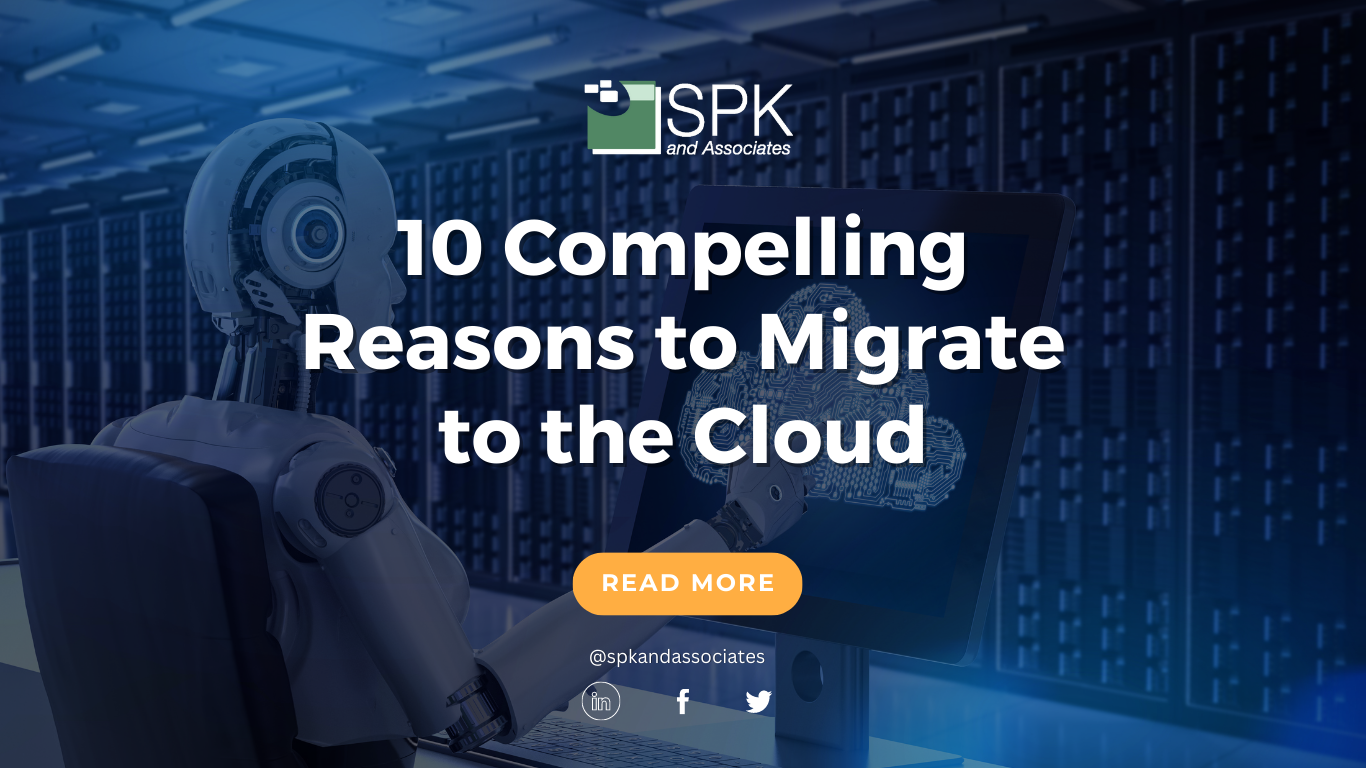Are you ready to move to the cloud? The cloud is a game-changing technology that has revolutionized the way businesses operate. So, we’re sharing the top 10 compelling reasons why you should plan to migrate to the cloud.
10 Compelling Reasons To Migrate To The Cloud
As a trusted managed services provider and Atlassian, AWS and Azure partners, SPK is in a prime position to provide you an unbiased opinion on cloud benefits (and the watch-outs!). Let’s dive in.
1. Cost Efficiency
Name a business that isn’t looking to save money. We’ll wait. Cloud computing offers significant cost-efficiency advantages. By migrating to the cloud you capitalize on the cloud server network as your horsepower from existing devices. That means you can reduce your capital expenditure on new hardware and infrastructure. That means you can keep those older devices for longer, but access higher-performing computational resources. Additionally, you opt for pay-per-use subscription-based cloud services. These can be more cost-efficient and flexible than physical hardware. Cloud providers offer various pricing models, meaning you can choose the one that best fits your budget and needs. Additionally, AWS and Azure provide cost optimization tools to help businesses minimize cloud expenses. And with a couple of our proven cloud cost optimization tips or by teaming your migrate to the cloud with tools like virtual CAD (vCAD), you can save even more money.
Now, there are instances where on-premises servers are still required. And, that’s ok. A move to the cloud doesn’t mean you have to migrate everything. In fact, a hybrid cloud can be incredibly effective too. It gives you the best of both worlds. Check out how hybrid cloud can turbo charge your manufacturing enterprise.
Lastly, the Cloud does promise lower costs. However, that doesn’t mean that for every physical server you need 1 large EC2 instance with AWS. This mindset can get companies into situations where they end up paying more for cloud services than they were paying for with physical infrastructure. Thus, trusting an AWS or Azure partner who architects cloud solutions will help attain the cost efficiency that is desired. Workloads are not the same on-prem as they are in the cloud and trusted cloud architects understand how to get the most out of the cloud solutions being used.
2. Scalability
Now let’s tell you about a move to the cloud versus business scalability. With traditional IT infrastructure, scaling up requires major capital investments in:
- New hardware.
- Software.
- Additional IT staff.
- Potential training.
Comparatively, the cloud allows businesses to add new users, applications, and services on demand, from anywhere in the world, without the need for major investments. This flexibility enables you to respond to changing market and customer needs. Now consider how useful this is for small businesses that are growing or fluctuate in demand with the seasons. Or for large enterprises either expanding further through mergers, or perhaps needing to downsize due to financial challenges. Cloud solves these needs.
3. Disaster Recovery
Even your new employees will know that disasters can happen anytime, anywhere, and can cause significant damage to a business’s operations. Disaster recovery is a critical advantage of migrating to cloud computing. With cloud-based disaster recovery solutions like AWS Backup, AFI Backup and Revyz, businesses can ensure that their critical data and applications are protected and available at all times.

Cloud providers have extensive redundancy and backup capabilities, which can:
- Help your business recover quickly.
- Minimize downtime in the event of a disaster.
4. Mobility
Mobility is a key advantage of cloud computing. Why? Because cloud-based solutions can be accessed from anywhere with an internet connection. That means whether you are operating with offices in different international locations, or, you’re big on the gig workers, or indeed you provide flexible working arrangements for staff, your talent pool can engage with customers and partners from anywhere in the world. Additionally, cloud-based collaboration tools like vCAD, or Office 365 (O365) video conferencing, instant messaging, and file-sharing, enable seamless collaboration and communication.
5. Increased Productivity
Cloud-based solutions are designed to help businesses streamline operations and boost productivity. With cloud-based collaboration software, teams can work together in real-time, from anywhere in the world as mentioned in the point above. But, it doesn’t stop at mobility. In fact, cloud-based automation tools can automate repetitive and time-consuming tasks. For example leveraging Infrastructure-as-Code (IaC) for testing. And, because the cloud enables quick addition of accessibility to new products and services you can scale and flex to deliver a project without waiting for expert installations or delivery of hardware. Oh the speed and joy of your team having the tools they need, only when they need them.
At SPK, we’re big on productivity all round. If this is something you’re interested in, you should definitely check out this blog from our very own CEO on deep work too.
6. Flexibility
Now, let’s cover that note above about flex in more depth. Cloud infrastructure allows you to dynamically allocate computing resources. For example, storage and processing power based on your current needs. This means you can easily scale your operations up or down as required. And, without the need for major hardware investments or lengthy deployment times. For example, if your business experiences a sudden surge in demand, you can quickly add more computing resources to handle the load. Similarly, if business needs change, you can easily adjust your cloud infrastructure accordingly. By leveraging the flexibility of the cloud, businesses can optimize operations, increase agility, and remain competitive.
7. Increased Security
We’re all aware the modern workplace is under attack. New threats and risks emerge everyday. Businesses that haven’t modernized their legacy tech are most at risk from vulnerabilities.
Cloud providers security is about as tight as it gets. They invest heavily in security measures, such as encryption, firewalls, and multi-factor authentication, to protect their customers’ data. Additionally, the cloud’s centralized management and data backup systems help to ensure that critical data and applications are always available, even in the event of a disaster or cyber-attack. However, there are still certain security measures that your business is responsible for too. These are outlined under the cloud providers Shared Responsibility Model. But, by leveraging the cloud’s security features, businesses can improve their overall security posture and reduce their risk of data loss or cyber-attacks.
8. Access to New Technology
Access to new technology is a significant benefit when you migrate to the cloud.
Cloud providers like AWS, Azure and Atlassian invest heavily in research and development to provide their customers with access to cutting-edge tools and capabilities. This includes technologies such as AI, machine learning, blockchain, and edge computing. These technologies can help your businesses gain valuable insights from data, automate tasks, and improve decision-making. For example:
- Using AI-powered chatbots to enhance customer service.
- Implementing machine learning algorithms to identify patterns in customer behavior.
Additionally, with the cloud’s constant updates and improvements, you can always access the latest technology. Without having to invest in costly hardware and software upgrades.
Need a bit more proof convincing on how accessing new tech in the cloud can help you gain competitive advantage? Check out the how and why behind the Salesforce cloud migration here.
9. Competitive Advantage
Adopting cloud-based solutions enables businesses to move quickly, scale efficiently, access the latest technologies and make data-driven decisions easier. This agility allows you to respond quickly to changing market conditions and customer needs. It’s a significant edge over your rivals. For example, businesses can use the cloud to:
- Quickly launch new products or services.
- Capture, analyze and capitalize on big data and data lakes.
- Scale up to handle sudden surges in demand.
- Automate processes to improve efficiency.

Additionally, cloud providers are constantly investing in new technologies and innovations, which can provide businesses with access to cutting-edge tools and capabilities.
10. Environmental Benefits
That’s right. When you migrate to the cloud, it can have significant environmental benefits. At SPK, we’ve been in business for 20 years. Over that time we’ve purchased and upgraded plenty of hardware. And we’re not alone. Combine that with the businesses globally doing the same, and just imagine where all that hardware and infrastructure is now. It’s a scary thought. That’s one of the reasons we’re big on cloud adoption. Aside from all the great benefits noted above, reducing reliance on physical hardware and infrastructure can reduce your carbon footprint. Cloud providers typically operate large-scale data centers that are more energy-efficient than traditional IT infrastructure. Additionally, the cloud’s scalability and resource allocation features help to optimize the use of computing resources, reducing waste and maximizing efficiency.
Conclusion
There you have it. 10 compelling reasons why you should move to the cloud. Now, if your brain is starting to buzz with all the opportunities, it’s time to start planning your cloud migration. You can check out our top 10 tips to plan your cloud migration here.
We know there can be a lot to think about when migrating to the cloud. From your current infrastructure, to your people’s impact, to your actual data migration and more. And, on top of that you still need to keep the plates spinning and your current customers flowing. That’s why working with cloud migration experts like our team at SPK has helped so many other businesses globally to migrate. We can support you to move to the cloud whether you are an SMB or enterprise.







